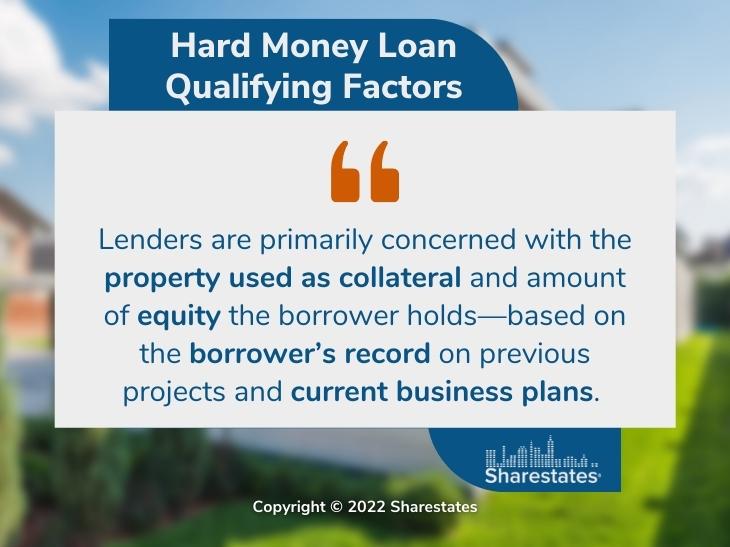The Duty of Hard Money Loans in Property Transactions: What You Required to Know
Difficult cash loans are an essential funding device in realty transactions. They supply financiers fast access to resources, specifically in urgent circumstances. Guaranteed by actual building, these fundings concentrate on property worth rather than the consumer's credit rating. However, they feature remarkable threats and expenses. Comprehending the nuances of tough cash car loans is crucial for anyone seeking to navigate this intricate monetary landscape effectively. What variables should financiers take into consideration prior to continuing?
What Are Difficult Money Loans?
Hard money car loans act as an important funding alternative in real estate purchases, especially for investors looking for quick access to funding. Unlike conventional loans, tough cash car loans are secured by real estate and are primarily based upon the value of the possession as opposed to the debtor's creditworthiness. These lendings are commonly provided by personal lending institutions or financiers, enabling consumers to bypass prolonged authorization processes connected with standard financing.
Difficult cash car loans are usually temporary remedies, with settlement periods varying from a few months to a couple of years. Due to their expedited nature, they are prominent amongst property fins and those requiring immediate funds for home procurement or rehabilitation. Passion prices for tough cash finances tend to be more than standard loans, showing the raised risk lenders carry out. Overall, tough money lendings fulfill a vital function in the property market, accommodating those who need adaptability and rate in their funding alternatives.
Benefits of Hard Cash Loans
While traditional financing can be cumbersome and slow-moving, difficult money finances use numerous distinct benefits that attract investor. One essential benefit is the speed of the funding procedure; lendings can commonly be approved and funded within days, enabling investors to confiscate opportunities rapidly. This rapid turn-around is especially useful in open markets where time is essential.
Furthermore, tough money loans are largely asset-based as opposed to credit-based, indicating that investors with less-than-perfect credit report can still safeguard funding. This ease of access makes it possible for a broader series of investors to take part in realty transactions.
Furthermore, tough money lenders usually have a lot more versatile terms contrasted to conventional lending institutions, enabling tailored payment strategies customized to private project requirements. This adaptability can enhance a capitalist's capacity to take care of money circulation successfully throughout restoration or resale stages. Overall, these benefits make hard money finances a compelling option for several real estate endeavors.
Prospective Downsides to Think About
While difficult money car loans can offer fast funding, prospective downsides require mindful consideration. Debtors usually face greater rate of interest rates contrasted to typical funding, which can raise general expenses. Additionally, the shorter repayment terms might press customers to safeguard refinancing or sell the home faster than expected.
Higher Rates Of Interest
Greater rates of interest represent a substantial factor to consider in hard cash financings, specifically in property deals. These loans typically feature rates that are substantially greater than standard funding choices, often ranging from 8% to 15%. This raised expense can influence the total productivity of a realty investment, as borrowers may discover themselves alloting a bigger part of their budget plan to rate of interest settlements. Additionally, the high rates can produce challenges for capitalists looking for to leverage their funding efficiently. For those that are not planned for these monetary effects, the worry of high-interest repayments can result in cash money circulation problems, inevitably affecting the success of the home financial investment. Understanding the ramifications of greater rate of interest rates is essential for possible borrowers.
Shorter Repayment Terms
Shorter repayment terms are a defining characteristic of difficult money car loans, which can provide various difficulties for debtors. Generally ranging from six months to three years, these terms require consumers to pay off the finance rapidly, commonly leading to economic stress. The stress to generate returns within a minimal duration can push consumers to rush residential or commercial property renovations or sales, potentially endangering the quality of the financial investment. Additionally, the need of a swift leave strategy might limit choices for refinancing or marketing, causing greater risks. Borrowers should thoroughly consider their monetary capabilities and market problems to prevent defaulting on these car loans, which can lead to the loss of the collateralized residential or commercial property.
How Tough Money Fundings Work
Tough money fundings operate with an one-of-a-kind framework that focuses on property worth over creditworthiness. The approval process is usually quick, enabling customers to access funds swiftly contrasted to standard financing. Additionally, an assessment of rate of interest discloses that difficult money fundings typically carry higher expenses, reflecting the boosted threat taken by lending institutions.
Car Loan Structure Explained

In realty transactions, recognizing the framework of tough money finances is crucial for financiers looking for useful source fast financing. Tough cash loans are generally secured by genuine estate, with the building offering as collateral. These fundings typically include higher interest rates compared to standard funding, showing the boosted danger taken by lending institutions. The loan terms are normally short, often ranging from six months to three years, facilitating rapid accessibility to resources. Finance quantities can differ considerably, usually depending on the home's worth as opposed to the debtor's creditworthiness. Investors take advantage of the expedited approval procedure, allowing them to seize investment opportunities quickly. In general, the structure of difficult money loans satisfies those needing quickly, flexible financing options in property markets.
Approval Refine Summary
The authorization procedure for tough money finances is distinct from traditional loaning techniques, primarily concentrating on the security as opposed to the borrower's credit rating profile. Lenders review the worth of the property being used as security, ensuring it satisfies their criteria for threat analysis. Once a residential property is determined, debtors send a loan application that consists of details about the property and the intended use funds (Georgia hard money lenders). The lending institution conducts a quick assessment and might call for extra documentation, however the process is commonly accelerated compared to traditional fundings. Approval typically occurs within days, permitting debtors to access funds quickly. This structured technique is useful genuine estate capitalists seeking fast funding options for purchase or renovation jobs
Rates Of Interest Contrast
While tough money car loans use fast access to funds, their rates of interest are usually higher than those of conventional mortgages. Borrowers can anticipate prices varying from 8% to 15%, depending on the loan provider and the specifics linked here of the purchase. On the other hand, traditional home loan rates usually drop between 3% and 6%. The greater prices related to difficult cash lendings reflect the enhanced risk loan providers take, as these financings are frequently protected by the home itself as opposed to the borrower's credit reliability. This suggests that while difficult money finances can help with swift financing for actual estate financial investments, they can likewise lead to significantly greater expenses gradually, making it vital for borrowers to thoroughly review their monetary situation before continuing.
When to Use Difficult Money Loans
When is it sensible to contemplate tough money lendings in actual estate transactions? Capitalists frequently think about these loans in situations where traditional financing is either impractical or inaccessible. Hard cash fundings can be advantageous for properties calling for quick procurement, such as foreclosure public auctions or distressed buildings requiring prompt remodellings.
Furthermore, investor looking for to maximize time-sensitive possibilities, like flipping homes, may discover tough money lendings useful due to their expedited authorization process. In addition, debtors with less-than-perfect credit or unusual buildings might likewise select tough cash funding, as lending institutions mostly concentrate on the home's value as opposed to the borrower's economic history.

Tips for Picking a Hard Money Loan Provider
How can capitalists assure they choose the right hard cash loan provider for their real estate demands? First, thorough research is vital. Financiers should review prospective lenders by assessing their track record, experience, and client testimonials. It is advisable to seek out lending institutions who specialize in the kind of home being financed, as this can enhance the possibility of positive terms.
Next, comprehending the loan provider's problems and terms is substantial. Financiers must ask about rate of interest, charges, and payment routines. Clear communication is critical; lending institutions need to agree to make clear any unpredictabilities.
In addition, reviewing click here for info the lender's funding rate and adaptability can be helpful, particularly in competitive markets. Capitalists need to likewise consider developing a relationship with the lender, as a good connection can help with smoother purchases. Ultimately, speaking with market experts or property agents can supply additional understandings and suggestions, making sure an educated decision.
Often Asked Concerns
Can Hard Money Loans Be Used for Commercial Characteristics?
Tough money finances can indeed be used for industrial properties, supplying fast financing options for investors - Georgia hard money lenders. These car loans are usually secured by the home itself, allowing customers to accessibility funds without conventional loaning needs
What Is the Regular Loan-To-Value Proportion for Hard Cash Loans?
The regular loan-to-value proportion for hard cash finances typically varies from 60% to 75%. This proportion varies based upon the home type, lender policies, and specific borrower conditions, reflecting the greater risk connected with these fundings.
Are Difficult Money Car Loans Offered to Novice Homebuyers?
Hard cash finances can be easily accessible to new buyers, though terms differ by loan provider. These fundings typically have higher rate of interest and much shorter payment periods, making them a much less standard selection for brand-new customers.
Exactly How Quickly Can I Shut on a Hard Cash Financing?
The rate of closing on a tough money funding can vary, yet typically it ranges from a couple of days to a number of weeks, depending on the loan provider's needs and the customer's economic circumstance. (Georgia hard money lenders)
What Documents Are Needed to Request a Tough Money Funding?

Unlike standard loans, hard money finances are safeguarded by actual building and are largely based on the worth of the possession rather than the borrower's creditworthiness. Interest rates for tough money financings tend to be greater than standard loans, showing the raised threat lending institutions take on. The authorization process for hard money car loans is distinctive from traditional borrowing techniques, mainly focusing on the security rather than the debtor's debt account. The higher prices associated with tough money lendings reflect the raised danger lenders take, as these financings are commonly secured by the property itself rather than the consumer's creditworthiness. To use for a hard cash financing, customers usually need to provide residential property details, a car loan application, evidence of revenue, credit rating background, and identification.